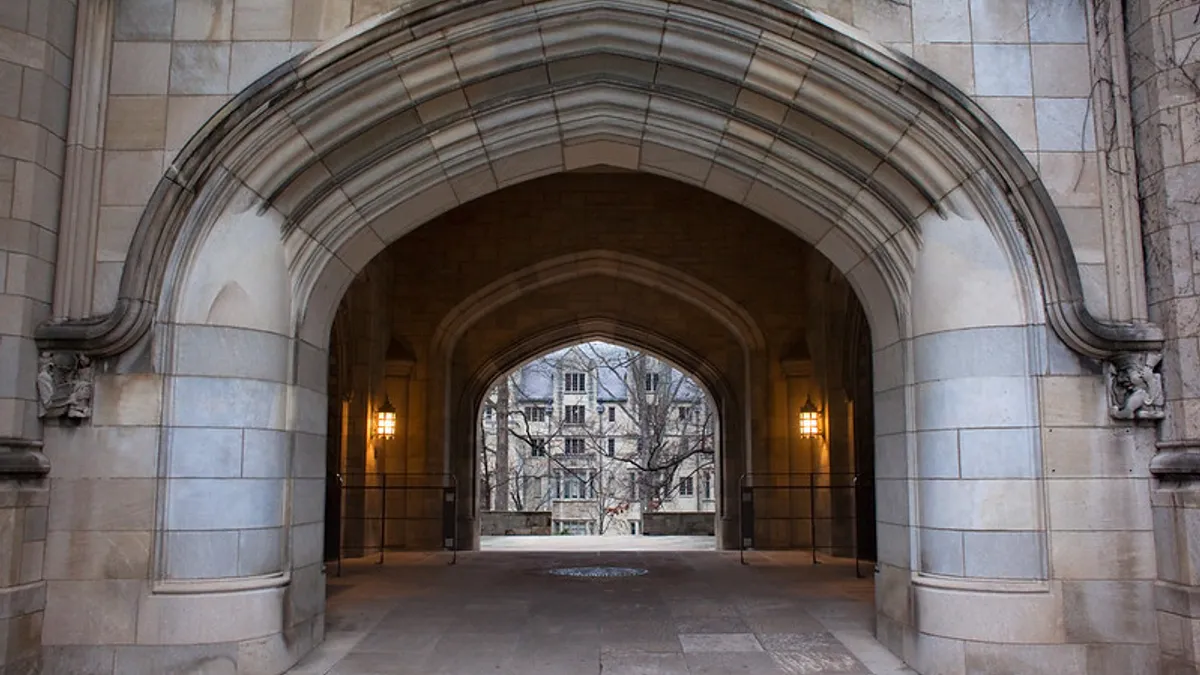Dive Brief:
- All but two of the eight colleges in the Ivy League reported dips in their acceptance rates this year, according to data compiled by Quartz. The declines continue a years-long trend of elite colleges appearing more selective as more students apply.
- Harvard University led the pack, admitting 4.5% of its 43,330 applicants, compared to 4.6% of 42,749 applicants a year ago. Other elite universities — including the Massachusetts Institute of Technology, Duke University and Swarthmore College — also saw acceptance rates drop.
- However, Princeton and Cornell universities saw their acceptance rates rise by 0.3% each to 5.8% and 10.6%, respectively. Both colleges had a decrease in applicants from 2018 to 2019.
Dive Insight:
The annual data on selectivity for colleges' incoming classes comes as the admissions practices of elite universities are under the microscope following the revelation by the Justice Department last month that dozens of wealthy parents allegedly paid millions in bribes in order to secure their children spots at top universities.
Several of the colleges linked to the scandal reported record-low acceptance rates for their incoming class, according to The New York Times. Yale University fell from 6.3% in 2018 to 5.9% this year, while the University of Southern California dipped to 11%.
News of ultra-low acceptance rates can feed into a cycle, prompting students to apply to more schools in order to hedge their bets, resulting in rates sinking even lower. And in many cases, institutions can benefit from their low rates, as they may make more students want to apply and factor into some college rankings.
There has been some movement for colleges to stop trading on their own selectivity. Stanford, for its part, said it wouldn't advertise application figures during the enrollment cycle. And the popular U.S. News & World Report Best Colleges ranking, which still factors into prospective students' decisions about where to go to college, dropped acceptance rates from its formula last year.
Other recent events have shone a spotlight on elite colleges' admission practices as well. Last year, a three-week trial was held to determine if Harvard discriminates against Asian-American applicants, while the Justice Department announced it was investigating Yale over the same issue.
It remains to be seen how both cases will shake out, but Alia Wong, a staff writer for The Atlantic, notes that the colleges wouldn't have come under so much scrutiny if their admissions practices focused less on selectivity. Ivy League institutions have been reluctant to grow their enrollment in recent years, she explains, even as the U.S. high school population has grown.
Others point out that the admissions process is ripe for fraud. Elite colleges tend to spend eight minutes or less on each application, The Wall Street Journal reported, meaning admissions officers generally don't have time to verify every claim a student makes.
Last year, T.M. Landry, a preparatory school in rural Louisiana, drew attention to that issue when it was exposed for doctoring the applications of its minority students in order to nab them spots at Ivies and other elite schools, The Times reported. The videos of the students opening their acceptance letters often went viral, featured on shows such as "Ellen" and "CBS This Morning," prompting questions over how so many colleges could be scammed.
But Will Stancil, writing for The Atlantic, argues that the T.M. Landry scandal also raises questions around the very idea of selectivity. "America's supposedly meritocratic system of elite higher education revolves around an intensive search for the most capable students," he wrote. "But if no one seems to know how to find those students when they come from the wrong background, and plenty of other people seem at least sufficiently capable, what's the point of it all?"
In the wake of the bribery scandal, some lawmakers have pushed for reform to college admissions. In California, five Democratic members of the State Assembly have laid out a set of sweeping proposals aiming to fix some of the issues brought to light recently. Among them, at least three administrators would have to sign off on special admissions, colleges would no longer be able to give preferential treatment to relatives of donors, and some admissions consultants would have to register with the state.
And in the U.S. Senate, Ron Wyden, a Democrat from Oregon, has announced legislation that would end tax breaks for those making donations to an institution where a family member is currently applying.








